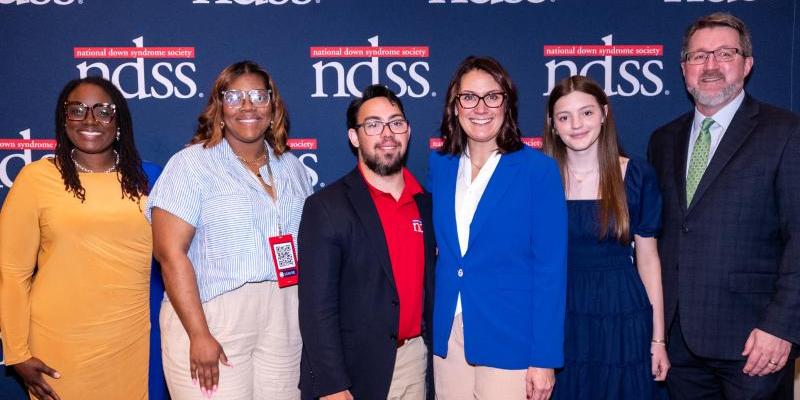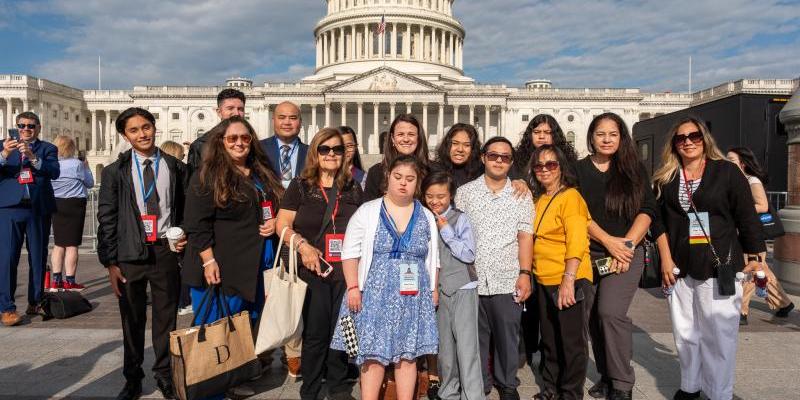This page was created with simplified language to assist readers with and without disabilities access the information. If you have any questions about the information on this page, please email policy@ndss.org.
What is Section 504 and why is it important to people with disabilities?
Section 504 of the Rehabilitation Act (commonly called Section 504) is an important law that protects people with disabilities, including people with Down syndrome, from discrimination. Discrimination is when you treat someone unfairly because of their disability, gender, race, or anything else. Section 504 states programs that get money from the federal government cannot discriminate against people with disabilities. This law ensures that schools, hospitals, government programs, and other organizations must provide equal access and reasonable accommodations for people with disabilities.
Nine states recently filed a lawsuit challenging Section 504. Scroll to learn about Section 504, and take action if you are a resident of Alaska, Florida, Indiana, Kansas, Louisiana, Missouri, Montana, South Dakota, or Texas.
Section 504 became law in 1973 and has been updated several times since then. The most recent update came in 2024 from the Department of Health and Human Services.
Here are specific examples of how Section 504 could protect people with Down syndrome and other disabilities:
- A college student with Down syndrome is pursuing a degree. The university must provide tutoring support, extended test time, and accessible dorm accommodations if needed.
- A young adult with Down syndrome gets a job at a federally funded hospital. If they need a job coach or written step-by-step instructions, the employer must provide these reasonable accommodations under Section 504.
- A patient with Down syndrome who is nonverbal requires a caregiver to assist with communication at a hospital. Section 504 ensures that the hospital cannot deny the caregiver's assistance or refuse necessary accommodations.
- A young adult with Down syndrome applies for a federally subsidized apartment. The landlord cannot deny them housing based on their disability and must allow necessary accommodations.
Texas v. Kennedy (formerly Texas v. Becerra)
In September of 2024, 17 states filed a lawsuit against Section 504. A lawsuit is when someone or a group of people brings a problem to the courts to get the problem fixed. In their original lawsuit, these 17 states said that new Section 504 rules, and all of Section 504, goes against the Constitution of the United States (also called “unconstitutional”) and states should not have to follow Section 504.
On April 11, 2025, the 17 states filed a report and said that they are no longer suing to say that all of Section 504 is unconstitutional. 8 of the states pulled out of the case altogether.
On January 23, 2026, the remaining nine states in the case updated their lawsuit to say that the integration mandate in the new rule from 2024 was unconstitutional. The integration mandate says that people with disabilities who receive services or supports from a program or organization that receive federal money must receive them in the most integrated setting appropriate. This helps people with disabilities get any support they need in the community rather than in institutions.
The nine states involved in the lawsuit are Alaska, Florida, Indiana, Kansas, Louisiana, Missouri, Montana, South Dakota, and Texas.
If the nine states are successful in their lawsuit, it could be harder for people with disabilities to continue to live, work, and participate in their communities. NDSS is deeply concerned with this updated lawsuit, and we urge the nine states involved to drop their lawsuit.
We need YOUR advocacy to help protect people with Down syndrome and other disabilities from discrimination.
If you live in one of the nine plaintiff states, you can use the below Action Alert to contact your state attorney general. If you live outside of these nine states, we encourage you to stay up to date with NDSS on social media and our newsletters for any updates or future advocacy opportunities.







